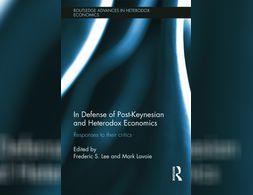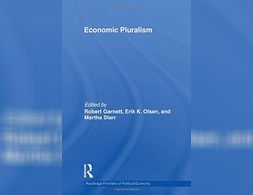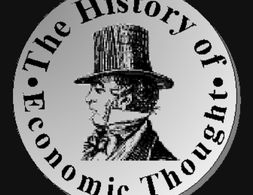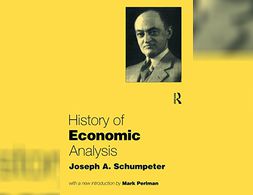✕
981 results
This course introduces students to the relevance of gender relations in economics as a discipline and in economic processes and outcomes. The course covers three main components of gender in economics and the economy: (1) the gendered nature of the construction and reproduction of economic theory and thought; (2) the relevance and role of gender in economic decision-making; and (3) differences in economic outcomes based on gender. We will touch on the relevance of gender and gender relations in at least each of the following topics: economic theory; the history of economic thought; human capital accumulation; labor market discrimination; macroeconomic policy, including gender budgeting; household economics; basic econometrics; economic history; and economic crises.
In this course we will critically analyze both economic theory and economic life through the lens of gender. Topics covered include: a critical examination of gender patterns and trends in the household, labor market, and the firm; issues concerning gender inequalities in the economy.
Feminist economics focuses on the interdependencies of gender relations and the economy. Care work and the partly non-market mediated reproduction sphere are particularly emphasised by feminist economics.
The workshop deals with the contribution of Plural Economics to the urgently needed change of the economic system towards sustainability and global responsibility.
After completing the module, participants should be able to demarcate and explain different economic approaches to sustainability. They should be able to evaluate the respective concepts based on their contribution to the ecological transformation of the economic system.
Economic sociology is an entire subfield and one could write an series on it, so I’m going to stick to probably the most prominent economic sociologist and the founder of ‘new economic sociology’, Mark Granovetter.
Although sometimes used as synonyms, economic growth and economic development refer to different processes. While economic growth refers to an increase in real national income and output (i.e., GDP growth rate), economic development refers to an improvement in the quality of life and living standards (i.e., life expectancy).
This module examines current socio-political issues through the lens of pluralism, that is pluralism of theory, pluralism of method and interdisciplinary pluralism
In this podcast 'How Economic Theory and Policy Reinforce Racism' William Spriggs, the AFL-CIO’s chief economist, discusses the inadequacies of the pandemic economic rescue package and the influence of mainstream economic theory. He further explores how mainstream economic theory continues to fail everyone, especially Black communities, by disregarding history.
With the onset of an economic crisis that has been universally acknowledged since the end of March, two main questions arise: To what extent is the corona pandemic the starting point (or even the cause) of this crisis? And secondly: can the aid programmes that have been adopted prevent a deep and prolonged recession?
After completing the module, participants should have knowledge and understanding about the theory of Critical Political Economy and its basic methods. They should be able to apply central concepts to analyse critical questions regarding the embeddedness of economic relations within broader social, political and ecological relations.
Post-Keynesian and heterodox economics challenge the mainstream economics theories that dominate the teaching at universities and government economic policies. And it was these latter theories that helped to cause the great depression the United States and the rest of the world is in.
This book highlights the political economy of wealth and income inequality in Latin America. The author segments his analysis to separately evaluate the economic, social, and political costs of inequality building on country case studies. It draws well-contextualized lessons from the Latin American experience that is important to consider for other regional contexts, especially for social policies of nations within the 'Middle Income Trap'.
Complexity economics focuses on interactions and interdependencies between individuals and structures in economic systems. Those are systems of organised complexity. High importance is given to the analysis of networks.
The workshop introduces into the field of critical political economy and tries to identify the role of finacial markets in capitalism, the reason for financial crises and the relevance of Marx in regard to these topics.
This article by Rüdiger Bachmann et.al. discusses the economic effects of a potential cut-off of the German economy from Russian energy imports.
Social and Solidarity Economy (SSE) and Feminist Economics make a conjoint statement: The way we see the economic system has nothing to do with human beings nor those who have been surviving outside the market.
This study aims to provide insights on how the Social and Solidarity Economy (SSE) is contributing to the future of work.
‘We cannot afford their peace & We cannot bear their wars’:
Value, Exploitation, Profitability Crises & ‘Rectification’
The leading edges of economic thinking in the early 21st century are marked by a nascent pluralism - a positive valuing of difference and complexity - regarding the nature and evolution of human behaviour and economic organization. Economic Pluralism brings these pluralist sensibilities to the fore.
In this 5 weeks online course, the Global Change Institute from the University of Queensland explains different types of climate change policies, the economic theory at their basis and the possible output. Starting from the fundamentals of carbon and climate change policies, and how they have been applied worldwide, the course aims to teach fundamental skills to move towards a low carbon economy.
In this essay, the principle of capital accumulation, as well as the idea of homo economicus as the basis of the growth model, are located and analyzed from a feminist perspective. The sufficiency approach is presented as an alternative to these two economic logics.
The website contains a vast amount of information on the history of economic thought. It presents thinkers, their main works (and links to those works) and schools of thought which are sorted by political economy schools, neoclassical schools, alternative schools as well as thematic schools.
This article considers the strengths of agent-based modelling and the ways that it can be used to help central banks understand the economy. These models provide a complement to more traditional economic modelling which has been criticised in the wake of the Great Recession.
In this episode of Jacobin radio, James K. Galbraith elaborates on the economic policies for the corona crisis, and Aaron Benanav on the crisis of unemployment. James K Galbraith also discusses why the economy as currently organized has been unable to deal with the challenges of the pandemic.
At the time of his death in 1950, Joseph Schumpeter was working on his monumantal History of Economic Analysis. Unprecedented in scope, the book was to provide a complete history of economic theory from Ancient Greece to the end of the Second World War. A major contribution to the history of ideas as well as to economics, History of Economic Analysis rapidly gained a reputation as a unique and classic work.
This Encyclopedia is a very first fully refereed A-Z compendium of the main principles, concepts, problems, institutions, schools and policies associated with political economy. Part 1 of a 2-volume set comprises entries from A-K.
As the Covid-19 fueled economic downturn begins to intensify this winter, an extended study of the Italian cooperative sector’s historical resilience in times of crisis can serve as a learning experience for other countries seeking to create policies that foster more stable economies, with job security, care for marginalized communities and adequate counter-cyclical policies. Particularly, the Italian cooperative sector’s contributions to three aspects should be noted in closing. Firstly, the innovative phenomenon of cooperative enterprises has contributed to social inclusion of immigrant communities, the activation of youth, the unemployed and people with disabilities, a true compensation for both a market and state failure. Secondly, they have contributed to a reduction in income and wealth inequalities at a time when the issue of inequality is of global significance. Thirdly, the Italian cooperative movement has helped local communities revitalize in the face of demographic shifts and rendered them more resilient to the ravages of globalization. Each of these in their own right is a remarkable achievement.
A comprehensive textbook on contemporary Global Political Economy and its historical evolution providing a broad-ranging and even-handed introduction to the subject by covering traditional elements (such as trade and finance) while also analysing issues such as gender, environment and labour.
This syllabus provides an overview of the contents of the course "Understanding Economic Models" at the University of Helsinki.
"Despite the rediscovery of the inequality topic by economists as well as other social scientists in recent times, relatively little is known about how economic inequality is mediated to the wider public of ordinary citizens and workers. That is precisely where this book steps in: It draws on a cross-national empirical study to examine how mainstream news media discuss, respond to, and engage with such important and politically sensitive issues and trends.
This course introduces students to the relevance of gender relations in economics as a discipline and in economic processes and outcomes. The course covers three main components of gender in economics and the economy: (1) the gendered nature of the construction and reproduction of economic theory and thought; (2) the relevance and role of gender in economic decision-making; and (3) differences in economic outcomes based on gender. We wil touch on the relevance of gender and gender relations in at least each of the following topics: economic theory; the history of economic thought; human capital accumulation; labor market discrimination; macroeconomic policy, including gender budgeting; household economics; basic econometrics; and economic crises.
To explain the pronounced instability of the world economy since the 1970s, the book offers an important and systematic theoretical examination of money and finance.
We use cookies on our website. Click on Accept to help us to make Exploring Economics constantly better!
























